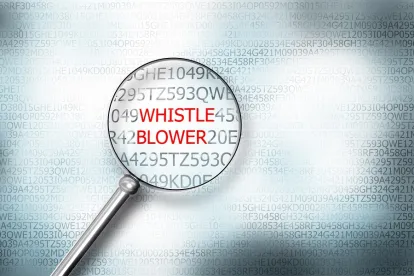Whistleblower Developments is a periodic report covering significant cases, decisions, proposals, and legislation related to whistleblower statutes and how they may impact your business.
Brink’s Company Charged for Unlawful Restriction on Whistleblower Protection
On June 22, 2022, the SEC announced a settlement with The Brink’s Company (Brinks) concerning alleged violations of Exchange Act Rule 21F-17. Rule 21F-17 prohibits any person from impeding an individual’s communication with the SEC about a possible securities law violation, including by way of a confidentiality agreement. From 2015 to 2019, Brinks required new employees to sign confidentiality agreements (and certain other agreements) that prohibited employees from disclosing the company’s confidential information to third parties without prior authorization and contained no exemption for would-be whistleblowers.
The SEC’s order notes that in April 2015, the SEC brought its first enforcement action for violation of Rule 21F-17 based on a company’s use of a restrictive confidentiality agreement. Thereafter, Brinks’ legal departments received law firm client bulletins, alerts, and other notices regarding this and other, similar enforcement actions. Despite these notices, Brinks revised the confidentiality agreement to impose a $75,000 liquidated damages clause (plus attorney’s fees and costs) on employees who violated the agreement. In 2017, Brinks added a whistleblower carve-out for executives in corporate-level severance agreements but provided no whistleblower exception in the confidentiality agreements until April 2019.
As part of its settlement with the SEC, Brinks agreed to add a provision in all employment-related agreements that clearly describes employees’ rights to communicate or cooperate with government agencies without prior notice to or approval from Brinks. Brinks also agreed to inform current and former employees who had signed the confidentiality agreement of this change in policy. Brinks further agreed to cease and desist from further violations of Rule 21F-17 and pay a penalty of $400,000.
The SEC’s order underscores the importance the SEC places on whistleblower protections for employees. It also serves as a helpful reminder for companies to ensure their policies align with the SEC’s requirements under Rule 21F-17.
D.C. Circuit Court of Appeals Affirms SEC’s Denial of Award to Early Whistleblower
In Ross v. SEC, the D.C. Circuit Court of Appeals affirmed the SEC’s denial of a whistleblower award, finding the claimant provided information to the SEC before the Whistleblower Program’s cutoff date. Ross v. SEC,No. 21-1165 (D.C. Cir. May 27, 2022). The Whistleblower Program was created on July 21, 2010 as part of the Dodd-Frank Act. Per the Act, to be eligible for awards, whistleblowers must provide their “original information” (as defined in the Act) after the date of the Act’s enactment. 15 U.S.C. § 78u-7(b).
In Ross, the whistleblower, Ross, was a stockbroker who provided information to a client regarding potentially fraudulent trading activity in her account. The client reported the suspicious activity to the DOJ and the SEC. Later, an assistant United States attorney requested to meet with Ross. Subsequently, Ross met with DOJ and SEC attorneys on several occasions, from 2005 to 2008. Ross submitted his formal whistleblower disclosures to the SEC in 2011, “incorporat[ing] by reference all the ‘original information’ voluntarily provided . . . since his discovery of the fraud.” The SEC’s subsequent enforcement action resulted in a $100 million judgment against the defendants in May 2014. The SEC rejected Ross’ whistleblower claim on two grounds: (1) He did not meet the requirement that the information be provided “voluntarily,” as required by the statute; and (2) Ross did not supply the original information after July 21, 2010. Ross challenged the SEC’s interpretation of “original information” in its rule requiring that such information be provided to the SEC after July 21, 2010.
The D.C. Circuit Court of Appeals affirmed with little difficulty. The court found the SEC rule was consistent with the language of the Dodd-Frank Act requiring that “original information” had to be provided after July 21, 2010.
Relatively Slow Quarter for SEC Whistleblower Awards Still Results in Awards of Nearly $10 Million
On May 6, 2022, the SEC announced a total award of nearly $3.5 million to four whistleblowers — three joint whistleblowers (Claimant 1) and one individual (Claimant 2) regarding a covered and related action. Claimant 1’s information caused the SEC to open a new investigation that led to a successful enforcement action and also led to another agency’s success in a related action. The SEC awarded Claimant 1 more than $2.8 million for the whistleblower’s assistance on the covered and related actions. While Claimant 2’s award was initially denied by the Claims Review Staff, the SEC ultimately awarded $600,000 for their independent analysis of publicly available information. The SEC called Claimant 2’s analysis “the result of unusual effort and intensive research over the course of many weeks,” and noted the information revealed allegations not previously known. But the SEC denied Claimant 2 any award for assistance on the related action, as that investigation was opened based only on Claimant 1’s information, and also because Claimant 2 did not significantly contribute to the related action.
On April 25, 2022, the SEC announced a total award of $6 million to two groups of whistleblowers (totaling five individuals) who provided information and assistance in a single action. The first group provided key documents that led the staff to request additional documents from the respondent. The first group also provided ongoing assistance to the staff, helping the staff to understand the respondent’s business practices. The second group provided valuable firsthand accounts of the misconduct at issue, as well as on-the-record testimony.







 />i
/>i
